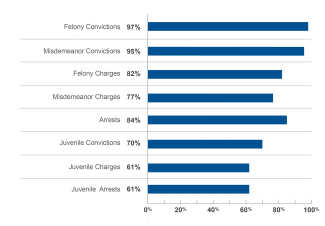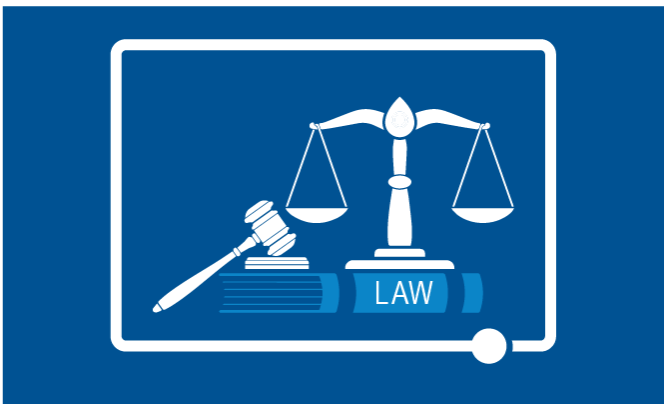Justice-Impacted Individuals in the Pipeline: A National Exploration of Law School Policies and Practices
Justice-impacted individuals include those who have been incarcerated or detained in a prison, immigration detention center, local jail, juvenile detention center, or any other carceral setting, those who have been convicted but not incarcerated, those who have been charged but not convicted, and those who have been arrested.
Approximately one in three adults in the United States has some form of criminal record—similar to the ratio of adults with 4-year college degrees in the U.S. (Friedman, 2015). The wide reach of the criminal justice system, including police contacts, arrests, and incarcerations, is heavily concentrated in poor communities and communities of color. Therefore, it is important to examine barriers specific to justice-impacted individuals throughout the application, enrollment, and educational experience in order to ensure that policies and practices do not unintentionally serve as mechanisms of exclusion that disproportionally impact applicants of color and low-income applicants.
The Law School Admission Council (LSAC), in collaboration with the National Justice Impact Bar Association (NJIBA), developed and administered the 2020 Justice Impact Law School Survey to explore policies and procedures that specifically affect law schools' justice-impacted applicants and students, focusing on policies, practices, and services during the 2019-2020 academic year. Eighty-five schools from across all geographic regions of the U.S. completed some or all of the survey. The results from the survey provide an overview of current law school practices related to (a) recruitment and admission; (b) applicants, admission, and enrollment; (c) application review procedures; (d) student information and services, (e) employees and training; and (f) policies. The purpose of this report is to initiate a conversation about justice-impacted individuals as part of LSAC’s mission to promote equity in access to legal education and to support diversity, equity, and inclusion (DEI) efforts.
Key Survey Results
- Only 2 of 85 responding schools reported intentionally recruiting students who were justice-impacted.
- The majority of schools indicated that they require applicants to disclose felony convictions, misdemeanor convictions, felony charges, misdemeanor charges, arrests, juvenile convictions, juvenile charges, and juvenile arrests.
Figure 1: Disclosures Required by Schools for Justice-Impacted Applicants (N = 61)

- Disclosure policies are largely driven by ABA-required disclosures, not by university policies, with the majority of the responding schools requiring the same disclosures as those required for the state bar application.
- Based on 24 reporting schools, the average admission rate of justice-impacted applicants was 36%, and the average enrollment rate was 39%. Many schools do not track whether students are justice-impacted.
- Four-fifths of schools reported providing information about how disclosures can affect students’ ability to sit for the bar exam once they are admitted, usually during orientation, with some noting they shared this information multiple times during a student’s law school tenure.
- All schools responded that they provide justice-impacted students with resources and/or assistance to navigate the state bar application and licensing procedure; however, most schools (71%) do not provide justice-impacted students with any other specific student services or resources.
- Only 4 schools indicated that they employ justice-impacted faculty and/or staff, while most schools reported they do not track that information.
- Very few schools (n = 5) reported that they offer training specifically addressing equitable treatment of justice-impacted students; few schools responding to questions about employees and training reported that their respective nondiscrimination policies specifically name justice-impacted people as a protected class, although none of the schools’ policies used that terminology.
Key Takeaways
While it is clear that additional holistic research is needed in this area, the results of this survey—the first national survey of its kind—show that there also needs to be more intentional tracking of, and more education about, justice-impacted individuals in the law school pipeline. This will require a collective effort involving multiple legal education and legal profession stakeholders in order to influence the policies and practices that, although well meaning, have created sometimes insurmountable barriers to justice-impacted law school applicants. Evaluating law schools’ policies and practices is crucial given that the literature shows they might be perpetuating a system that disproportionately disadvantages law school applicants of color. The survey results indicate that the first step stakeholders in legal education can take to address existing inequities is to provide law schools with more up-to-date information about justice-impacted individuals, to work with schools through education and action to begin breaking down the stigma surrounding justice-impacted individuals, and to begin evaluating current practices and policies that impact justice-impacted individuals’ journey to law school and acceptance to the bar. With this report, we seek to begin a national conversation to inform diversity, equity, and inclusion efforts with the intention of increasing access to law school and beyond.
If you have any questions about this brief, please contact Liz Bodamer at ebodamer@LSAC.org.
References
Friedman, M. (2015, November 17). Just facts: As many Americans have criminal records as college diplomas. Brennan Center for Justice. http://www.brennancenter.org/our-work/analysis-opinion/just-facts-many-americans-have-criminal-records-college-diplomas



